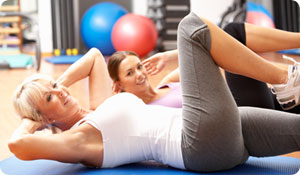
Working up a sweat is good for you, but what if you're not one to perspire during exercise? Can you still consider it to be an effective workout? The answer is "yes!"
Most people sweat more during a high-intensity workout than a gentle stroll in the park. There are definite benefits to working out long enough and hard enough to get sweaty. Sweat isn't always an accurate way to measure the benefits, intensity or results of a workout, though. That's because everyone's body is different and no two people sweat alike. Some people break a sweat when they're sitting on the couch while others rarely sweat. It's also because some types of strenuous exercise don't require our bodies to sweat. Other less-strenuous types of exercise may not make us sweaty, but are still valuable and beneficial.
Sweat is our body's natural cooling solution. Most people sweat at least a little when they exercise because movement heats their muscles up, but it isn't our only way to cool off. The body releases heat so it can sustain activity without overheating by four methods:
- Radiation - heat radiates out of the skin to cooler air surrounding the body.
- Conduction - heat is transferred directly to something cooler than the body, like water in a shower or pool.
- Convection -air movement cools the body, like when we stand in front of a fan or exercise in a breeze.
- Evaporation - water (sweat) collects heat from inside the body and transfers it outside the body where it can evaporate.
All exercise heats the body, but our workout conditions directly impact how sweaty we need to get. If excess body heat can be released through radiation, conduction or convection, then evaporation (sweat) may not be necessary. Take, for example, swimming. It can be a strenuous, athletic, total-body workout, but body heat can be released into cool water (conduction). Skiing provides an excellent, vigorous workout, but body heat can be released into cold surrounding air (radiation). Someone who works out in an air conditioned room or directly in front of a fan cools their body with convection instead of evaporation. If exercise conditions are hot and humid and there's no breeze for miles, even a gentle workout can be a sweat-drenching experience.
Some people (like most men) have more active sweat glands and a higher percentage of water in their bodies than others (most women). That means they release heat through evaporation more easily. It also means they get sweatier, faster, even when exercising at an equal intensity and duration.
If you hate getting sweaty or need a workout that doesn't require a change of clothes, give yoga, Pilates, walking, biking, or stretching a try. You'll burn calories, tone muscles and gain plenty of exercise benefits, even if you're not dripping wet by the end.





